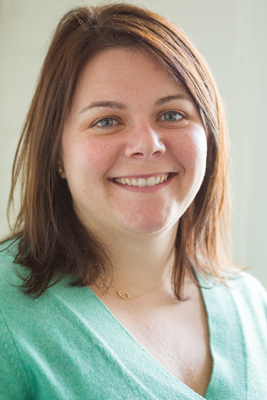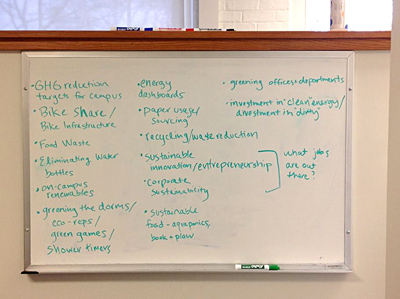December 18, 2014
By Madeline Ruoff ’18

Laura Draucker, Amherst’s director of sustainability
This past summer, Amherst College created the Office of Environmental Sustainability. The office’s first director, hired this fall, is Laura Draucker, whose primary goal in this new role is to “integrate sustainability into the daily life of campus.”
Draucker lauds Amherst for what it has already done to improve sustainability—Dining Services is incorporating local produce, new buildings are designed with the environment in mind, operations are consuming energy more efficiently—and she plans to better communicate these accomplishments to the student body. However, she knows that Amherst can do even more to embrace sustainability in a way that directly relates to its students.
Draucker defines sustainability as the “intersection of environmental, economic and social growth” and feels that “[for us] to be successful as a society, environmental sustainability will have to be ingrained into all kinds of sectors … in a way that protects the earth and society of future generations.” She hopes to demonstrate how to “integrate sustainability into student life and work” and raise more awareness of related issues.
This is Draucker’s first time working at a college—she previously held positions at the World Resources Institute and the Environmental Protection Agency—and she is “very excited to be here,” seeing potential to “make a huge difference.” Draucker considers liberal arts colleges “living labs,” because they “can test out projects related to energy efficiency that cities and governments might not have the ability to try.” In doing so, colleges “help society at a large think about these issues.”

A whiteboard in the Office of Environmental Sustainability
While Draucker is eager to work with already established environmental groups on campus, she would also like to expand to “meet with more student groups that may not have thought of the impact of sustainability and social responsibility.” For example, she hopes to encourage the Investment Club to consider sustainable entrepreneurship. Furthermore, although Amherst already has an environmental studies major, she would like to see more departments “incorporate sustainability in classes” and have students “think about projects and ways [my office] can innovate.”
Draucker emphasizes that there’s “a lot of opportunity for engagement, from alums to current students.” She plans on forming an advisory board, offering internships and organizing an event to officially launch the Office of Environmental Sustainability, located in room 103 of the College’s Service Building. In particular, she would like student input in identifying means of improvements for sustainability at Amherst and welcomes “anyone with ideas to stop by or email.”